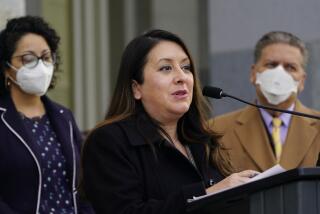Nicaragua Assembly Plans Draft Constitution Based on ‘Reality of Revolution’
MANAGUA, Nicaragua — A Sandinista-dominated national assembly opened here Wednesday with the mission of writing a revolutionary constitution that will be “a new experience in Latin America.”
The 96-member National Constituent Assembly elected Carlos Nunez, a top Sandinista commander, as its chairman.
Nunez told the assembly that the constitution it will debate and approve will be a “product of the revolution that destroyed the whole political and legal order of the system of exploitation that had ruled in our country since colonial times.”
“This national assembly has those functions so that there may be a new experience in Latin America, destined to make an important contribution in constitutional law,” he said.
-------------------------------------------------------------------------- ‘We are going to fight,’ an opposition representative said.
-------------------------------------------------------------------------- Some opposition politicians have expressed fear that the Sandinistas will draft a constitution based on authoritarian Marxist-Leninist principles. Nunez did not elaborate on his vision of the constitution, but he emphasized that the assembly will create “a political system framed in the reality of the revolution.”
Boycotted Election The Marxist-inspired Sandinistas seized power in July, 1979, after leading a bloody national uprising against right-wing dictator Anastasio Somoza.
The revolutionary government held elections for the first time Nov. 4, although a major coalition that included the Social Christian and Social Democratic parties boycotted the vote. They complained that the dominant Sandinista political machine and a lack of press freedom made a fair contest impossible.
Daniel Ortega, one of nine members of the powerful Sandinista Directorate, won the presidential contest with 67% of the vote. Today, he will be inaugurated for his six-year term.
In the same election, Sandinista candidates took 61 of the 96 seats in the assembly that opened Wednesday. Six other parties have a total of 35 seats, including a seat awarded to the unsuccessful presidential candidate of each party that ran.
Opposition Weak Adan Fletes, a Social Christian leader, said the weak opposition in the new assembly could not stop the government from passing a Marxist-Leninist constitution. However, he said, that would be costly for the Sandinistas.
“It would fortify the counterrevolutionary groups, it would give more arguments to the U.S. Administration, and it would take away from their support in Europe and Latin America,” Fletes said.
In addition to writing a constitution, the assembly will act as a national legislature. The election of Nunez as chairman, with 80 votes, indicated the ease with which Sandinista legislation will be passed.
With 14 seats, the Democratic Conservative Party is the second-largest delegation in the assembly. The Independent Liberal Party won nine seats and the leftist Popular Social Christian Party six. The remaining six are held by three Marxist-Leninist parties: the Socialists, the Communists and the Marxist-Leninist Popular Action Movement.
Entitled to Seats The Independent Liberals will be the clearest opposition to the Sandinistas in the assembly. The party leadership had voted not to participate in the November elections, but the Liberal candidates’ names remained on the ballot and the Supreme Electoral Council ruled that they were entitled to the seats they won.
After weeks of wavering, a party commission voted Sunday to take the seats. Previously, the party suspended the membership of Constantino Pereira, who had insisted on maintaining his candidacy for vice president after the party voted to pull out of the November elections.
Ulises Somarriba, secretary general of the Independent Liberals, said Wednesday that the party will take a position of vigorous opposition in the assembly.
“We are going to fight,” he said. “We are not going as collaborationists or passive observers. Even though we are at a numerical disadvantage, we believe it is necessary that there be people who raise their voices in protest.”
More to Read
Sign up for Essential California
The most important California stories and recommendations in your inbox every morning.
You may occasionally receive promotional content from the Los Angeles Times.










